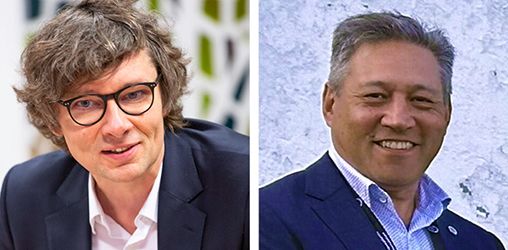
By Tomas Lamanauskas, ITU Deputy Secretary-General, and Dean Veverka, ICPC Chair
Hundreds of commercial submarine cables, now extending more than 1.7 million kilometres around the globe, support digital connectivity for countries, communities, businesses, and people on every continent.
These digital linkages can be vulnerable, but countries and companies are stepping up cooperation to enhance the resilience of submarine cables as the backbone of global digital communications.
The International Telecommunication Union (ITU) and the International Cable Protection Committee (ICPC) are working together to strengthen this critical digital infrastructure.
The International Advisory Body for Submarine Cable Resilience was established in 2024 to provide a mechanism for cooperation. Led by Nigeria and Portugal, it brings 42 members from governments, operators, the cable industry, and other sectors together. Its remit is strictly practical: to help strengthen cable protection and resilience, improve deployment and repair times, identify and mitigate risks, enhance redundancy, and share best practices for the whole world’s benefit.
Our first International Submarine Cable Resilience Summit, held in Abuja, Nigeria, in early 2025, highlighted the value of working across borders and created an important new arena for these discussions.
The second summit, taking place in Porto, Portugal, on 1 and 2 February, is an important opportunity to solidify cooperation on issues that risk impeding cable resilience globally.
Challenges for an expanding network
Globally, submarine cables experience around 200 faults each year, over 80 per cent of which are caused by fishing and anchoring. The remainder of faults are typically caused by natural hazards such as earthquakes, storms, powerful currents along the seafloor, or equipment failure. Cable faults can pose a risk of service interruptions, slower connectivity, and, in some cases, economic disruption, especially in countries dependent on a single cable landing point.
Bolstering submarine cable resilience
Over the past decade, the length of submarine cables worldwide has increased by more than 70 percent. While the total length continues to increase, the number of cable faults remains relatively static.
However, in some regions, the time needed to commence each cable repair has increased.
One reason is regulatory barriers or permitting requirements, which often slow down the arrival of repair vessels to address a breakage. Some of the Advisory Body’s work has focused on the encouragement of streamlined regulation and operational rights for vessels of different nationalities.
In addition, the availability of repair vessels is limited in some regions, which can leave operators exposed to long delays when faults occur. For example, Tonga’s week-long isolation following a cable break in 2024, the latest of three major breaks in five years, was another demonstration of how a single point of failure can sever a nation’s digital lifeline.
The Red Sea – a key route for submarine cables – remains a risk zone for multiple regions and markets. Cable ships face complex access constraints, forcing operators to reroute traffic.
Yet global demand for artificial intelligence (AI), cloud services, and advanced industrial applications continues driving up digital traffic across all major routes. Enhancing the resilience of submarine cables is imperative in today’s interconnected world.
Cooperation to strengthen protection
These pressures explain why cooperation has deepened among governments, operators, and international organizations over the past year.
Even in an era of sharp geopolitical division, the International Advisory Body on Submarine Cable Resilience and its three Working Groups bring together major global players who are working side‑by‑side – an implicit recognition that submarine cables are critical infrastructure and form a vital lifeline for digital connectivity globally.
Practical cooperation, therefore, continues in areas where political trust may otherwise be in doubt. Because we all depend on this vital infrastructure that carries over 99 per cent of international data traffic.
The public-private structure of these discussions is also deliberate. Since most cables are under private ownership, resilience depends on aligning public policy needs and investment incentives. The ICPC’s wide membership brings technical depth and expertise from cable owners, vessel operators, and the entire supply chain. ITU, for its part, provides global clout, a long tradition of neutrality, and credibility built on 160 years of setting technical standards.
What our second summit can achieve
In Porto, governments, regulators, operators, and international organizations aim to discuss practical steps: streamlining deployment and repair permits, ensuring geographic diversity, improving information‑sharing, facilitating investment into infrastructure, and supporting countries most at risk from single points of failure.
With the Advisory Body’s working groups providing concrete, evidence-based recommendations, our second summit marks a shift from agreed intentions to actionable cooperation.
The envisaged Summit Declaration should capture our key commitments and support even more closely coordinated work in the year ahead.
Submarine cables are critical infrastructure in the strictest sense: they keep economies functioning, societies connected, and governments operational.
We have a collective responsibility to make sure these digital lifelines keep the world connected.
Learn more and register for the summit.
Global Connectivity Report 2025.
Header image credit: ASN
